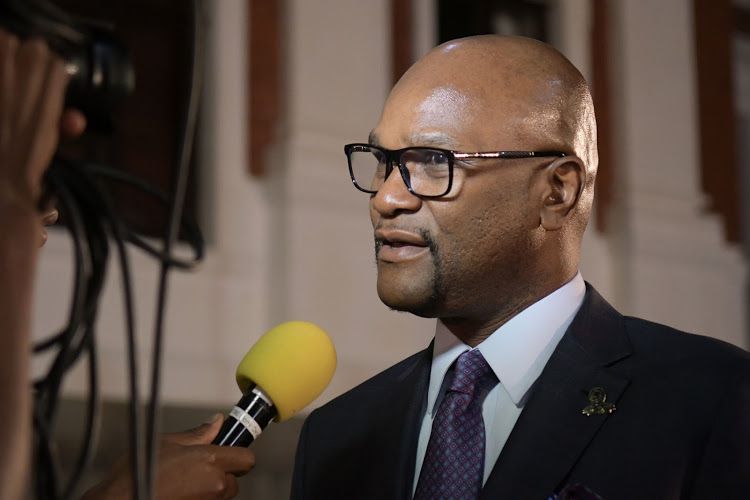Following consultations with the South African Sports Confederation and Olympic Committee (Sascoc) and the Cultural and Creative Industries Federation of South Africa (CCIFSA), the Department of Sport, Arts and Culture (DSAC) has finalised the criteria to distribute the R150m Covid-19 relief fund for artists and athletes.
The finalisation of criteria will also assist technical personnel and the core ecosystem that supports them to soften the economic impact of the coronavirus pandemic on their livelihoods.
“The criteria for accessing this support, the identification of beneficiaries and the mechanism through which the relief fund will be managed has now been finalised in consultation with Sascoc and the CCIFSA for the different sectors,” said the department.

Minister of Sport, Arts & Culture Nathi Mthethwa - © Jeffrey Abrahams
The announcement follows a pronouncement of measures that would be taken by sport, arts and culture minister Nathi Mthethwa on Wednesday, 25 March 2020.
Assisting those affected by Covid-19
Under the fund, athletes who were confirmed to participate at events that have now been cancelled or postponed due to coronavirus, and whose income is generated solely through specific sporting events.
“They must provide proof that their events have been cancelled and their taxes must be in order,” said the department.
The department said coaches and technical support personnel must work with athletes, whose sporting events have been cancelled or postponed due to Covid-19, and make their earnings solely from these events, to qualify for relief.
They too must have their tax matters in order.
“Athletes on the Operation Excellence Programme (OPEX) are potential medallists earmarked for international multi-coded events such as the Olympics, Paralympics, Commonwealth Games, etc. and the above conditions and criteria are applicable to them,” the department said.
It added that for sports, relief will only be availed to athletes, coaches or technical support personnel after the date on which the cancelled or postponed event would have been held.
“The department reserves the right to determine the quantum of relief based on the availability of resources,” the department said.
The finalised criteria
The following categories of arts and culture are to be considered for support through the relief intervention.
- For DSAC-funded projects that have already entered into a memorandum of agreement (MOA) with the department and the first tranche of payment has been made, where artists, venues and other suppliers of the project have been paid, but the project implementation has been cancelled due to Covid-19, the beneficiaries will be compensated for the expenditure incurred.
- In addition, to benefit from the compensation, the beneficiaries will have to submit a claim that does not deviate from the original MOA and provide supporting documents such as contracts and valid invoices to the department.
“The DSAC reserves the right to determine a flat rate fee for all such beneficiaries. The above criteria also apply to funding and associated institutions such as the National Arts Council (NAC), the National Film and Video Foundation (NFVF), the National Heritage Council (NHC), Business and Arts South Africa (BASA), etc.,” the department said.
- For DSAC institutions whose productions and events have been cancelled, the playhouses that have had to cancel productions scheduled from March to June will pay the artists and practitioners who were already booked for these productions.
- For cancelled non-DSAC funded projects, the list of 25 productions and 15 live events already submitted by national industry organisations will be compensated.
To benefit from compensation, producers and organisers are required to submit a spreadsheet of the costs that were due to be incurred from March to June with proof of existing contracts and relevant documentation.
A second spreadsheet of the full details of practitioners and committed costs will also be required. The department reserves the right to determine the compensation to be made.
For the arts, relief will only be availed to producers, organisers, project managers and department beneficiaries after the cancelled project/event would have been held.
The department reserves the right to determine the quantum of relief based on the availability of resources.
Online solutions
Meanwhile, the department has been receiving, and will continue to accept, spontaneous project proposals for the use of online solutions (4th Industrial Revolution) until 4 April 2020.
“These concepts should respond to the effect of Covid-19 on the sport, arts and culture sectors with digital platforms, VOD ideas (video on demand), streaming, podcasts, social media, webinars, short animations and documentaries, etc.,” the department said.
Compensation will be made in the form of a flat rate payment, to be included in the proposal.
The department reserves the right to make the final determination of the artist’s fee. The duration of the project must be limited to two months, and not more than five pages, clearly outlining the concept, budget and time frames.
The projects must also involve artists to assist them in making an income during these difficult times. A list of artists and practitioners must also be provided. Only proposals from good standing compliant sector organisations will be accepted.
The proposals should be addressed to the Arts Culture Promotion Development (ACPD) Branch and sent to az.vog.cad@91divoc.CASD by 4 April 2020.
“The above relief support of the Department of Sport, Arts and Culture is guided by Schedule 5 of the Constitution of the Republic of South Africa.
“Therefore, athletes that have not earned the status of being national athletes would have to be catered for by their respective provinces, and projects and events that are not considered to have an impact at a national level, involving artists and practitioners from various provinces, would have to approach their respective provinces,” said Mthethwa.
Excluded from the relief framework are athletes, coaches and technical personnel, who do not rely solely on income earned from participating at sports events and permanently employed personnel in institutions and organisations. In other words, these are all athletes and art practitioners on fixed-term contracts (with salaries).





































